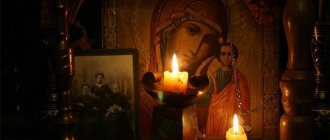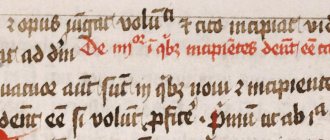Notes for the repose - 3rd, 9th and 40th days
According to tradition, after the death of the deceased, notes for the repose are written on the 3rd, 9th and 40th days. Therefore, every time you visit a temple or church, it is worth submitting notes of repose for the nearest Liturgy, since in this way the sins of the dead are “washed away.”
After death, the soul remains on earth for two days, free to visit places dear to its heart, and on the third day it must undergo twenty aerial ordeals, peculiar tests for one or another sin. That is why on the 3rd day after death the soul needs special prayer. Submitting a memorial note with the name of the deceased is necessary to help the soul of a deceased loved one.
From the 3rd to the 9th day the soul contemplates the heavenly abodes, and from the 9th to the 40th - the horrors of hell. Therefore, prayer on the 9th day serves as support for the deceased.
On the 40th day, the fate of the soul until the Last Judgment is determined, but it is worth remembering that through prayer and alms it is still possible to change the fate of the dead. For this purpose, they also submit notes of repose for the Liturgy.
It is worth recalling that to calculate a specific day (3rd, 9th, 40th), the day of death must be counted as the first day, even if the person died around midnight.
Civil funeral service
Previously, when people came to the temple, they brought some kind of offering with them. There is an order of one ancient liturgy, which states that children who could not bring anything had to bring at least simple water. Believers brought bread with them, brought wine for a joint meal after the liturgy, brought candles, brought oil to light it in lamps. No one came to the liturgy empty-handed. The liturgy is also called the “sacrament of offering.” All these gifts were evidence that we, as the deacon calls us during the litany, are ready to give ourselves and each other, and our whole lives to God: “We ourselves and each other, and our whole life (our whole life) to Christ God let us betray,” exclaims the deacon at the end of almost every litany. These gifts were evidence that we offer our lives to God, they were a sign of love. Like a young man, when he goes to meet his beloved, he carries a bouquet of flowers or a box of chocolates.
Over time, Christians forgot about this wonderful custom and think that they are buying something in church: they are buying prayers, buying candles, buying prosphora. Prosphora actually began to be bought for money at some point in history, because not all people could bake exactly the kind of bread needed to celebrate the Eucharist. And you could buy it from the prosphora girls in order to give it to the priest at the altar during the liturgy, along with a little book in which the names of close relatives (living and deceased) were written, so that he could pray. Sometimes money or some kind of gift was invested there for the priest himself, because he did not work anywhere, only served in the church.
But in huge temples, everyone cannot give their offering to the priest. If one hundred, two hundred, three hundred people who are in the church hand over their notes and prosphora to the priest, it will be very difficult for him. He must take the prosphora out of each bag, take out the particles from it, read the notes, put it back in the bag and return it to the person who gave it. Although when I began my service in a rural church, this custom was still preserved there. Therefore, in churches, these notes and prosphora, which are no longer bought from the prosphora maker, but right there behind the box, are transferred to the temple by the temple servants.
Sometimes the priest takes out a piece from the prosphora for each name. Sometimes he takes out a piece of the entire note. Sometimes the priest takes out the particles, and someone nearby reads the notes out loud to him. Sometimes, when there are a lot of notes, say, on Parents' Saturday, they are read by all the people who serve at the altar. Therefore, for those who want to be especially prayed for him or his loved ones, there is an opportunity, by paying more money, to ask for his note to be read in some special way. Although I think, of course, that this is not entirely correct. It turns out that the one who paid the most was remembered at the liturgy not once, but three times: they took out a piece, read the note and prayed during the litany.
If you have some special request, it is better to approach a priest you know and ask him to pray especially for people close to you. You say: what to do if the priest is unfamiliar? But, dear friends, you can’t go to an unfamiliar priest all the time. If you are just starting to go to church, of course, everyone there is unfamiliar to you. But you need to find a priest whom you trust, who will become your confessor; you can ask him to pray. When someone asks me to pray (sometimes they send me SMS or email), they tell me about this person. And when I pray, I know who is asking and why. And this prayer is easier for me than simply listing some names of people I don’t know. For the saints, of course, it was not so. Sometimes mountains of notes were brought to the holy righteous John of Kronstadt, he put his hands on these notes and said: “Lord! Remember them all!” Through his prayers healings were performed.
So, I think it is not entirely correct to accept notes at different prices. Of course, it would be better to take them simply for donations. This also happens in some churches in our church. But this sometimes leads to very unexpected results. For example, in one church in Moscow they stopped charging certain amounts for notes and did not limit the number of names. People, having learned this, began to bring entire sheets covered in small handwriting. Whoever wants it will give a ruble for a note, whoever wants it will give ten rubles, and whoever doesn’t want it will give nothing. And the sisters in this church, and the brothers, and the priests are simply exhausted, because there is a huge amount of notes - people take advantage of what is free and write more. In the hospital, I remember when you come to someone’s room, the neighbors see that the priest is confessing and administering communion, and they ask: “Father, how much does it cost?” I say: “Free” - “Free? Oh, well, then I’ll be there too.”
There is such a concept - sacrifice.
A voluntary sacrifice, of course. The church must exist for something. Therefore, of course, the priests need to do everything for free, but you and I still donate money to the churches, to the clergy who work there, they also need some kind of maintenance. Tags:Liturgy, priest
How to write a funeral note
The death notice must be formatted as follows:
There should be an 8-pointed cross on top, followed by the inscription “about repose” and only then the names of the deceased should be listed. Names are written in the genitive case, indicating the full form of the name given at the person’s baptism. Usually at the beginning of the note the names of the clergy are indicated with an indication of their rank. If forty days have not yet passed since the date of death, then you can indicate the word “newly deceased” (abbreviated “new.”) before the name.
“Simple” and “custom” notes. How to treat different practices?
Here [in the church of St. Nicholas in Kuznetsy - approx. ed] there is no difference between the notes, all the notes are the same. I believe that the commercial approach in the Church is a very dangerous thing. And in our church all services are performed free of charge - there is no fee for prayer services, funeral services, weddings, christenings, or commemorations at the proskomedia. And parishioners can donate as much as they want to the piggy bank, which is in the church.
We, of course, remind parishioners that parish life is our common cause, our common responsibility; that in order for parish life to proceed in the desired way, funds are needed, and these funds can only be donated by everyone together, collected by the entire community. And parishioners donate. So we're managing somehow.
But it must be said that, of course, no wealth is obtained, there is absolutely no surplus left. Sometimes it's difficult. But when something really difficult happens, the Lord sends us help: some rich man comes and brings us the money we need. We have been living this way for decades, and the Lord has not left us. I think that God is pleased with our desire to fulfill God’s commandment: “Eat here, give here” (Matthew 10:8), without any commerce. And, in my opinion, this is correct.
As for the notes, this question is not so simple. Because, on the one hand, diptychs have been known since ancient times. A diptych is two tablets; on one are written names for health, and on the other - for repose. Those who donated to the Church were also recorded here, as if giving them gratitude. Such commemorations have been in the Church since ancient times, but still they never had the character of commodity-money relations. And then gradually the diptychs take on the character of a note that can be submitted for money. This means that the more notes, the more expensive they are, the more income the temple has. In Russia this has developed especially, since in Russia the churches are large and there have always been many parishioners, it is natural that in large churches there are a lot of notes and it is simply impossible to read them.
For example, when Father John of Kronstadt served, there were such mountains of notes that he simply took them all, brought them to the Throne and said: “Lord, remember everyone who is written here” - and did not read them. And he didn’t even take out all the prosphoras, but blessed them, took out one prosphora and said: “Lord, remember everyone for whom these prosphoras were given.” And through his prayer there were many healings of those who were recorded in these notes, although no one read them.
But reading notes in itself is not magic. What difference does it make who reads: the altar boy reads or the priest mumbles? It's not magic, is it? It is clear that if a priest prays with all his heart: “Lord, heal this sick woman who will have a difficult operation today,” then he can put his heartfelt participation into this; and when there are few names, and a small community, and the priest says: “Father, pray for this sick person” - then it makes sense. When asked, and he knows who and what he is praying for. And when there are mountains of notes, all the names are written in a row, and you don’t know who is who here - is it so important that he mumbles these names, or that the altar boy skims them?
We read these notes so as not to be some kind of modernists and renovationists and not to destroy traditions. But, honestly, I can’t treat this as some kind of meaningful action. In my opinion, when the litany is said, all parishioners should remember their sick and deceased, because they know for whom they are praying. You can let the priest pray for those he knows and say: “Father, pray for these and these,” but only in such a way that he understands for whom he is praying - then it makes sense.
And if you just read mountains of notes, then I don’t think there is any big difference depending on how and who reads them. Are they “custom” or “simple”, what color are they marked or what box is ticked - I think this does not change anything.
How to write memorials (requests) correctly?
In the note “On Health” we mention everyone to whom we wish health, salvation, goodness, and prosperity. The concept of “health” includes not only the health and physical condition of a person, but also his spiritual state and well-being.
We ask for health not only for those close and dear to us, but also for those who have done us harm, whom we have offended. If we pray for the health of a person who has offended us, committed evil towards us, it means that we want the Lord to change his intentions, to make our ill-wisher turn to God, to learn to be at peace with others.
For all ill-wishers, offenders, envious people or even enemies, it is imperative to pray, according to the commandment of the Lord: “love your enemies, bless those who curse you, do good to those who hate you, and pray for those who offend you and persecute you” (Matthew 5:44).
Prayer for enemies, offenders, envious people, for those who are in a quarrel is a great power for pacifying and ending hostility, for admonishing and establishing peace. Notes (commemorations) are submitted by parishioners behind the candle box (in our church this is the place to the left of the entrance where candles, crosses, icons are sold, where services are prepared).
Notes should be submitted before the start of the Divine Liturgy, celebrated in the morning, or the night before (in this case, your notes will be read at the morning Liturgy). Before the start of the Divine Liturgy, the notes are passed to the altar, where the clergy read them, offering prayer for our family and friends. For each name indicated in the note, a particle is taken from the prosphora. At the end of the Liturgy, these particles are immersed in the Chalice with the Body and Blood of Christ, and the priest pronounces the following words: “Wash away, Lord, the sins of those here remembered by Your Honest Blood through the prayers of Your saints.”
Commemoration during the Divine Liturgy is a special type of church-wide prayer. When ordering prayer, we care about the health and spiritual salvation of our loved ones or the blessed repose of the departed.
Home prayer, as a rule, does not have such grace-filled power as common prayer, united prayer, the prayer of the Church. Church prayer is the prayer about which the Lord said: “Truly I also say to you that if two of you agree on earth about anything they ask, it will be done for them by My Father in heaven, for where there are two or three are gathered in My name, there I am in the midst of them” (Matthew 18:19-20).
It is most correct to start a note with the name of your spiritual father, the priest who instructs you, cares about the salvation of your soul, and prays to the Lord for you.
Then write the names of your parents, your name, the names of your family members, loved ones and relatives. Behind the names of your family and relatives, write down the names of your benefactors. If they did good to you, then you should wish and pray for good and blessings from the Lord for them, so as not to remain in debt to them.
There are certain rules for writing church notes:
1. Write in clear, understandable handwriting, preferably in block letters, trying to mention no more than 10 names in one note.
2. Title the note “On health” (for the living) or “On repose” (for the dead).
Now many churches have ready-made forms for such notes. If there is no ready-made form, then on a small blank sheet of paper, first draw an eight-pointed Cross and then write “On health” or “On repose.”
3. Names are written in the genitive case (the “whom” question). For example, “On Health” by Mary , Olga , Mikhail , etc.
4. Use the full form of the name, even if you indicate small children in the note (for example, not Andryusha, but Andrey, not Dasha, but Daria, etc.)
5. Find out the church spelling of secular names (for example, not Egor, but George, not Victoria, but Niki, not Artem, but Artemy, not Sergei, but Sergius, not Polina, but Apollinaria, not Svetlana, but Fotinia, not Ivan, but John, etc.). If you find it difficult and don’t know how the name will sound in church spelling, you can always turn to the temple servants for help.
6. Before the names of clergy, indicate their rank, in full or in abbreviated form. For example, priest (or abbreviated as hier.) Victor, archpriest (archpriest) Vladimir, archimandrite (archim.) Gabriel, deacon (deacon) Peter, etc.
7. Children under 7 years old are called babies. Over 7 years old - a youth (adolescent). Example: “About health” junior. Hope, youth John, youth. Lyudmila.
8. There is no need to indicate the last names, patronymics, titles, professions of those mentioned and their degree of relationship in relation to you.
9. It is allowed to include in the note the words before the name: “warrior” (this is how military personnel are called - for example, the warrior Demetrius), “sick” (everyone who is sick is called), “traveling” (who is on the road, on a business trip), “lost " (baptized people who have left Orthodoxy, non-believers), "suffering" (for example, from an illness: drunkenness, drug addiction, smoking, gambling), "student" (schoolchildren, students), "grieving" , "monk", "nun" .
10. On the contrary, there is no need to write clarifications such as “maiden”, “widow”, “embarrassed”, “pregnant”.
11. In funeral notes, the following should be indicated before the names: “On the repose” of the “newly deceased” (as the deceased is called for forty days after death, including the day of death, even if it occurred close to midnight), “of ever-memorable” (the deceased who had on this day of memorable dates: date of death, birthday, name day), “killed” (died a violent death).
12. Those whom the Church has already glorified as Saints (for example, Blessed Matrona, Blessed Xenia) no longer need to be remembered in the notes “On Repose.”
13. In the Church you can only remember the church names of Christians who have been baptized in the Orthodox faith. Unbaptized people are not remembered in church. You can and should pray for unbaptized people in front of icons at home (in private).
14. If your baptized deceased relatives for whom you are praying were not buried, then they should be “interred” by ordering an absentee funeral service.
15. The names of suicides cannot be mentioned in church notes. You can only pray for people who have committed suicide at home. If, by mistake or ignorance, you submitted a note about a person who, according to Church rules, cannot be commemorated in the Temple, then you must tell the priest about this during confession.
Notes can be submitted for the Divine Liturgy:
1) A simple note - served for commemoration at Proskomedia - the first part of the Liturgy, when for each name indicated in the note, particles are taken from special prosphoras, which are subsequently dipped into the Blood of Christ, with a prayer for the forgiveness of the sins of those commemorated;
2) A customized note for the Liturgy (Lunch is the common name) is submitted for commemoration both at the Proskomedia and publicly at the Sublime Litany, read immediately after the Gospel. This note can be read by both the Deacon and the Priest.
3) Sorokoust is a commemoration that is performed by the Church daily for 40 days. Every day during this period at Proskomedia, particles are removed from the prosphora for each name. “The Sorokousts are performed in remembrance of the Ascension of the Lord, which occurred on the fortieth day after the Resurrection” (St. Simeon of Thessaloniki).
Sorokousts can be ordered both for health and for repose.
In addition to ordinary notes (simple, custom, sorokoustov), you can order semi-annual, annual and eternal commemorations. Most often, such commemorations are ordered in monasteries.
At the end of the Liturgy, prayers (for health) and Panikhidas (for repose) are served in many Temples. This way you can submit a note for both the Prayer Service and the Memorial Service.
A prayer service is a special prayer singing to the Lord, the Mother of God or the Saints. Therefore, the prayer should be titled: “Prayer to the Lord for health” or “Prayer to St. Nicholas for those traveling ,” or “Prayer to Sergius of Radonezh for help in studying ,” then write the names for whom you are praying. Prayers of thanksgiving are always served only to the Lord Jesus Christ.
When you submit a note for the prayer service, tell the minister whether you are ordering the Blessing of the Waters prayer - in this case, a Small Blessing of the water is performed, which is then distributed to all believers - or a regular one, without the Blessing of the Waters.
Notes should be submitted in advance (preferably the night before), before the start of the Divine Liturgy, because commemoration during the service is performed only up to a certain point - the Cherubic Song (“Like the Cherubim...”).
Filling out a note is a spiritual component of this process: when writing down the names of the living and the deceased, remember them in the process of writing from the bottom of your heart and with sincere wishes for their good, prosperity, and salvation of the soul. By remembering the person whose name you enter, you are already praying for him.
Memorial
In those families where the traditions of Orthodox piety are respected, there is a commemoration book, a special book in which the names of the living and the dead are written and which is presented during the service for remembrance. Memorial books can still be purchased in churches or Orthodox book stores. Memorials are kept near home icons or in your church near the candle box.
Information taken from the site https://spirovo.ortox.ru/
When to submit funeral notes?
As you know, churches exist on voluntary donations from parishioners. Therefore, funeral notes are usually paid for. Notes can be submitted:
- for proskomedia
- this is part of the ritual that is performed before the liturgy. For each name, a church minister takes particles out of the prosphora, then puts them into the Chalice with the Blood of Christ and prays for the forgiveness of sins. - for the liturgy
- memorials are read out before the Holy See. - at the litany
- the names of the deceased are remembered publicly. - for a prayer service
. Prayer services can be ordered (they are performed at the request of those praying) and general (held at the end of the liturgy).
You can also submit a memorial separately at the memorial service. If there are no church obstacles, then regardless of the date of death, you can order a funeral service for the deceased or a church commemoration for a period of six months or a year. In monasteries, requests for commemoration may be accepted for longer periods.
The Church prays for the dead every day, with the exception of special holidays. People who want to communicate with the dead and feel unity with them can do this during prayer. Arriving at the temple, anyone can submit a note of repose with the names of deceased relatives, loved ones or acquaintances. During the service, the clergyman will take out the prosphora, then immerse them in the Blood of the Lord and say the words: “Wash, O Lord, the sins of those remembered here by Your Honest Blood, by the prayers of Your saints.” After the liturgy, prosphoras are often distributed to those who submitted a note (one prosphora per note). In memory of the deceased, the prosphora will need to be eaten directly in church or at home on an empty stomach.
Church prayer for repose has more grace-filled power than home prayer, because many believers gather in the church and help the deceased with their prayers.
Other articles
Funeral meal
Remembrance of the Dead
Funeral rites in world religions
Calendar of church holidays for 2013
A church note - so simple and... incomprehensible?
Sometimes the most complex and incomprehensible things in a church for us are the simplest things... For example, church notes. For me, as a person who spent more than 11 years at the altar, the question is: “What is the difference between a prayer service and a magpie?” looked funny. Until I realized that my friends and acquaintances were asking me this question too often.
Then I decided to conduct a small survey to understand what it was about church notes that my friends and colleagues did not understand, and it turned out that they did not understand literally everything!
Some wondered why the notes were written, where they were then taken, and what happened next to them and to the people for whom they were written.
Others faced the problem of filling out the note: Is it possible to enter the names of everyone or only those who are baptized? What to do if you don’t remember a person’s baptismal name? How to correctly distribute those entered into categories: “pregnant”, “soldier”, “student”, “hieromonk”, and is it even necessary?
Still others tried to understand what was the meaning of dividing notes into ordered and simple ones, magpies, prayer services and memorial services?
Finally, the fourth were concerned about the money issue. What happens if the note costs 10 rubles, but there are only 8 in your pocket? Will they refuse to accept and pray? Or why in one temple they charge money for a note, and in another for each name? If I have many relatives, should I save money on their commemoration and not submit notes for all of them? I'll try to tell you about everything.
1. Why are notes written and what happens to them later?
The Savior Christ Himself said: “Truly I also say to you that if two of you agree on earth about anything they ask, it will be done for them by My Father in heaven, for where two or three are gathered in My name, there I am in the midst of them” (Matthew 18:19-20).
These words of the Lord indicate that although home prayer is of great importance, conciliar prayer in church is still more valuable and stronger, so it is very correct to visit it as often as possible and prayerfully remember your loved ones there.
When the notes are written and given to the church shop, they await the arrival of the sexton, who will take them to the altar. There they, if these are so-called “simple notes”, will be commemorated twice.
First, the priest will prayerfully remember each of your loved ones during proskomedia - a special sacred rite, when prosphora and wine are specially prepared for the offering of the Bloodless Sacrifice for all believers, during which the Holy Spirit mysteriously transforms them into the Body and Blood of Christ.
At the proskomedia, the priest, using a special knife - a “copy”, will take out from the small prosphoras exactly the same number of particles as there are names contained in the notes collected for this liturgy, while praying for each of the indicated people. In large cathedrals there are a lot of notes, so the commemoration at the proskomedia can be performed simultaneously by several priests - each with his own part of the notes.
The second time your loved ones will be remembered is at the end of the Sacrament of Communion, when the priest brings the Holy Chalice to the altar. Then he will read the prayer: “Wash away, Lord, the sins of those remembered here, with Your Honest Blood, through the prayers of the saints,” and pour into the Chalice all the particles taken out for the people remembered on this day. Through contact with the Body and Blood of Christ, all those commemorated will receive special divine help for their physical and spiritual recovery and correction of life.
If the notes that you submit are “custom”, then they will additionally pray for those remembered by you three more times: the deacon will remember them during the reading of the special litany to them, then the priest will read a prayer before the altar, and then, depending on the “about” “health” this note or “about repose”, it will be read again with prayer, respectively, at a prayer service or at a memorial service.
2. Who can and cannot be included in the notes, when is it best to submit them and how to format them correctly?
It is best to submit notes at the evening service or at the very beginning of the liturgy, at least before the reading of the Gospel, since the priest must still have time to remember your loved ones, then prepare the Holy Gifts for transfer from the altar to the throne and, during the Great Entrance, move them there, after why the particles are no longer removed.
During divine services, the Church commemorates all people in general prayers (“... Let us pray to the Lord for those who sail, travel, are ill, suffer, and are captives, and for their salvation...”, etc.), but the commemoration by the priest in the altar is reserved for the faithful children of the Church - that there are baptized people. Also, when talking about the deceased, people who deliberately took their own lives are not remembered. The Church prays for everyone else.
It is recommended to write the names of those commemorated in the genitive case (about the health/repose of whom? - Nicholas, Elena, Pavel,..) and in full (Nicholas, not “Kolya”, Peter, not “Petya”). You should also try to write names accepted in the church tradition (Elena, not Alena, Sergius, not Sergei, George, and not Zhora, Gera, Yegor or Yuri). In this case, the person’s baptismal name is indicated (Vladlen, Arthur or Oktyabrina definitely have a second name given at Baptism).
Now about the titles. If we talk about the oldest tradition, then no titles other than holy orders were indicated in the notes. All names were written one under the other, in a column, and only clergy had some kind of prefix before their name: “Metropolitan.” - metropolitan, "bishop" - bishop, "hierome." - hieromonk, “deac.” - deacon, "mon." - monk.
Somewhat later, they began to add prefixes to the names of people requiring special prayerful commemoration - “in.” before the name of the warrior due to the severity of his service, “Jr.” - before the baby's name because of his tender age and "bol." - before the name of the sick person, because at the moment he is struggling with an illness.
Now many believers are trying to somehow single out almost everyone, and the priest is forced to spend a lot of time analyzing various fantasies like “teacher,” “fruit,” “ber,” “neg.” and others. This is not a particularly good tradition and you should not write out notes in this way.
If you still don’t remember or don’t know the name of a person in baptism, but you know for sure that he was baptized, write as it is - the priest will remember him, and the Lord knows exactly what name was given to him. But try to find out the church name of your loved one!
3. What is the meaning of separating notes and what types of notes are there?
Notes are primarily divided into two types - about the living and about the dead. They are divided into simple and custom-made because in churches, especially in large cathedrals, there can be very, very many notes and remembering all of them as custom-made can take a very long time, which delays the service and can be physically difficult for believers praying in the church, who spend the entire service carried out on their feet.
Commemorations are also divided into liturgical and non-liturgical, one-time and reusable.
At the service, only notes on health and repose (simple and custom) and church memorials are read, where relatives of priests, clergy, benefactors, etc. are written.
After the service, an additional prayer service (with or without the blessing of water, to the Lord, the Mother of God or a saint, for one or another need) or a memorial service may be served. A prayer service is served for the living, a memorial service for the dead. At the prayer service, custom-made notes about health and notes for the prayer service (with the inscription “prayer service”) are read, at the memorial service - custom-made notes about the repose and notes for the memorial service (with the inscription “requiem service”).
There are also multiple commemorations, the so-called “magpies”. They are also for the living or for the deceased and are commemorated at the same moments of divine services and extra-liturgical prayers as customized notes. The sorokousts differ only in the duration of the commemoration - they can be served for 40 days (hence the name “sorokoust”), for six months or for a year at once.
In some churches and, especially, in monasteries, you can order “eternal remembrance” or the reading of the “Indestructible Psalter.” Both for the living and for the dead. But since this does not happen everywhere, we will not consider these commemorations.
4. Money issue
Like the candle, the note is a form of our sacrifice to God and our contribution to the maintenance of the temple. In ancient times, people brought with them everything they needed for worship - bread, incense, wax, oil, wine, they themselves built a church in their village and gave a tenth of their income for its maintenance.
It is quite difficult for the current manager to make wine, and for a factory worker to collect wax from beehives... That is why we bring money to the temple and that is why in church shops there is such a seemingly Jesuitical formulation as “the recommended form of donation.”
If you don’t have enough money for baptism, or if you receive a note, the solution is quite simple - you just need to go to the rector of the church, explain the situation, and in the vast majority of cases he will bless you to give as much as you can and will prayerfully remember your relatives as well as your relatives any other person.
Finally, regarding notes and names. By this method, as a rule, they try to regulate the number of notes in churches in which there are very few priests and a lot of parishioners. In churches where everything is balanced, the amount of donation is usually calculated by the number of notes. Where the priest is overloaded, they establish a standard for names. Then the person decides who is really important to him, and for whom he can pray at home, and the priest receives some relief when remembering thousands and thousands of names. It’s also a good idea for us believers to take care of him!
Afterword
At this point, I consider the educational program dedicated to church notes to be complete. If you think that any important issue has been overlooked and you would like to address it, please write in the comments. In this case, the article will be supplemented.
Dear brothers and sisters, I hope that with the answer to some of your questions, the temple has become a little clearer and friendlier for you! Come to church more often to pray to the Lord in the company of Orthodox Christians who are unanimous in your opinion. Remember that not only you yourself need dialogue with Christ, but your living and deceased loved ones are also waiting for your prayer.
Andrey Szegeda
https://pravoslavie.fm/articles/tserkovnaya-zapiska-takaya-prostaya-i-neponyatnaya/











